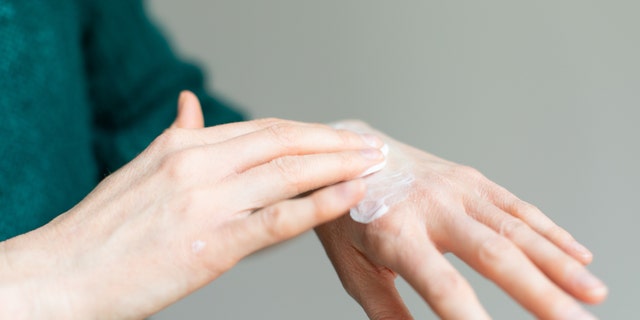Hand washing is an expert-recommended way to stave off a COVID-19 infection, but it can lead to dry, cracked skin. Even more, winter is on the way, bringing with it cold, dry weather that is notoriously hard on the skin.
Fox News spoke to Dr. Latanya Benjamin, a Society for Pediatric Dermatology executive committee member, to learn why winter is so harsh on the skin and what you can do about it.
Read on for a look at what she had to say.

Hand washing is an expert-recommended way to stave off a COVID-19 infection, but it can lead to dry, cracked skin. Even more, winter is on the way, bringing with it cold, dry weather that is notoriously hard on the skin.
(iStock)
Fox News: Why is winter weather so harsh on the skin?
Benjamin: At this time of year and heading into the winter months, dry, cold air and harsh wind and central heating can cause the skin to lose water and natural oils more quickly than usual. Fall and winter weather can also trigger skin conditions such as eczema and psoriasis, to flare up or bring out winter dry skin, also known as winter itch, in others. This can result in rough, red skin that can feel itchy, uncomfortable and become irritated or infected. Dry skin occurs when the skin doesn’t retain enough moisture and dries out, resulting in roughness and cracking. The most effective way to manage this is to establish a consistent skincare routine (for yourself, children and teenagers!) that will seal as much moisture into the skin as possible.
CORONAVIRUS FACE MASKS HAVE INCREASED BOTOX DEMAND, PLASTIC SURGEON SAYS
Fox News: What are some top moisturizing tips to help prevent and soothe dry skin?
Benjamin: Moisturize after washing, and frequently. Apply moisturizer regularly, and at least two times per day to your infant. The most important time to moisturize is immediately after bathing or handwashing while the skin is still slightly damp. This will provide a barrier seal to hold existing water in the skin.
Use a thick cream or ointment. In general, the thicker the moisturizer, the more effective it will be. It is best to avoid lotions, which are thinner and may contain alcohols that are drying or irritating – generally, the thicker the moisturizer, the better the barrier it provides.
Use lip balm to prevent dry, chapped lips. If you or your child has dry skin, they may also have chapped lips, which are often neglected. Choose a lip balm that can be easily applied in order to prevent lips drying out from cold, dry air.
Fox News: From ointments and lotions to prescription topical creams, what are the best products to use and which should you avoid?
Benjamin: When looking for skincare products for the whole family, it’s increasingly important to be mindful of product ingredients and marketing claims to avoid issues. Not all moisturizers are meant for all ages – for example, some have anti-aging ingredients that can irritate young children’s skin. If you would like to find a product that everyone can use, focus on fragrance-free products. Products that avoid parabens and formaldehyde can also be helpful to avoid skin irritation and other health hazards.
A top tip for selecting an effective moisturizer is to choose thicker moisturizers over thinner ones. If possible, I advise parents to avoid lotions altogether as they are often thin and don’t moisturize as effectively as other products, and they are more likely to contain added preservatives and alcohols that irritate sensitive skin. If your child has dry skin, ointments like petroleum jelly and thick white creams are quite effective at sealing in moisture.
Fox News: How can you tell the difference between dry skin and an eczema outbreak?
Benjamin: There are a few guidelines that you can use to determine the difference:
Eczema is itchy: It is sometimes called “the itch that rashes,” as often, people will start itching before you can even see anything noticeable on their skin.
Dry skin: Eczema is closely related to dry skin, and symptoms can, in some cases, be managed with gentle skincare and frequent moisturization. If the dry skin evolves into a red rash with scaly, itchy papules or patches, this is a tell-tale sign of eczema.
The symptoms don’t go away: The only way to properly diagnose eczema is to receive a medical diagnosis. If yours or your child’s skin is not doing well despite following good skincare recommendations and using medications from a primary care doctor, then you should ask about a referral to a pediatric dermatologist for your child, or a dermatologist for yourself.
RECOVERING CORONAVIRUS PATIENTS EXPERIENCING JAW PAIN AS SYMPTOM POSSIBLY CAUSED BY BREATHING ISSUES
Fox News: How can you manage and treat eczema flare-ups?
Benjamin: Disproportionately affecting babies and young children, it is the most common problem treated by pediatric dermatologists. In most cases, eczema symptoms in children and adults can be successfully managed with a regular, gentle skincare routine and following guidelines from your dermatologist, such as:
- Limiting your exposure to known triggers. Avoid products that may cause irritation, and stay away from allergens (food or environmental) that have affected you in the past. Try to steer clear of harsh alkaline soaps, perfumed products, and switch to fragrance-free laundry detergent if possible.
- Moisturize regularly. Moisturizing often with a thick cream will help lock water into the skin, keep it hydrated and prevent dry skin from cracking. This will also lessen the chance of worsening itch and developing a skin infection.
- Topical medications. Often, doctors will prescribe a skincare plan with simple home treatments to manage symptoms and may recommend topical medications on the affected areas. The most commonly used medications are topical steroids. If the eczema is severe, your dermatologist may recommend stronger systemic medications to keep the symptoms under control.

